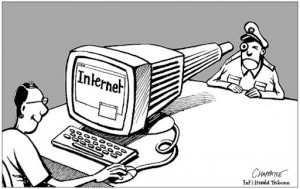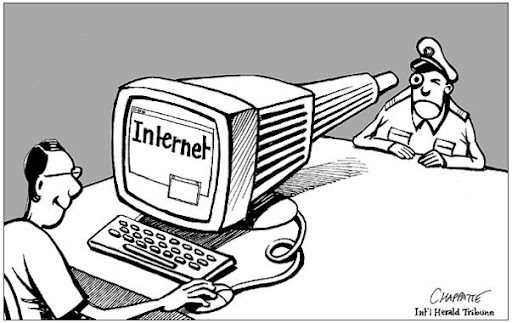 In a Panel on Freedom of Expression on the Internet, the Cairo Institute for Human Rights Studies (CIHRS) in cooperation with the Egyptian Initiative for Personal Rights (EIPR) delivered an oral statement before the 19th session of the Geneva-based UN Human Rights Council currently in session. A high-level list of panelists composed of UN and state officials, and heads of multi-telecommunications companies took the floor. Speakers included the UN High Commissioner for Human Rights, Navi Pillay who spoke of the importance of internet in the context ongoing unrest and expressed concern over certain practices like blocking access to websites and committing violations against human rights defenders for using social media tools to document rights violations.
In a Panel on Freedom of Expression on the Internet, the Cairo Institute for Human Rights Studies (CIHRS) in cooperation with the Egyptian Initiative for Personal Rights (EIPR) delivered an oral statement before the 19th session of the Geneva-based UN Human Rights Council currently in session. A high-level list of panelists composed of UN and state officials, and heads of multi-telecommunications companies took the floor. Speakers included the UN High Commissioner for Human Rights, Navi Pillay who spoke of the importance of internet in the context ongoing unrest and expressed concern over certain practices like blocking access to websites and committing violations against human rights defenders for using social media tools to document rights violations.
In their joint statement, CIHRS and EIPR revealed the existence of documented proof that the telephone and internet blackout in Egypt during the 18 days revolution[1] was a premeditated crime organized between the Interior Ministry and the local heads of multi-national telecommunications and internet companies. Both organizations argued that official documents from 2010 and 2011, included strategies to cut off internet access in a single city and in several cities, blocking particular websites, and obtaining personal information. In addition to other strategies to tap into online accounts, plant spy files on computers, and other highly invasive abilities.
The statement pointed out that the responsibility for human rights violations and abuses does not lie solely on the state, but also private actors such as companies are liable for such violations.
“The Human Rights Council has the duty to find alternative means to hold private multi-national telecommunications and internet companies liable for these violations” said Ramy Raouf, Online Media Officer at EIPR. “The national and international legal vacuum, under which these companies are currently operating, is further endangering the lives of peaceful pro-democracy protestors and citizens in repressive states” he added.
The two Egyptian organizations argued that asking corporations to conduct a due diligence process is not enough since “in many instances the private companies themselves have violated their own user agreements, but with little consequence since no sufficient external or multi-national ombudsman exist to ensure that these companies apply basic human rights standards.”
“If the International Community is serious in implementing policies that protect the life of civilians during peaceful protests, a resolution or international guidelines should be developed to ensure that online companies have a limited access to users’ information and that the users themselves have access and control to what personal information companies have and own” said Laila Matar CIHRS’ UN Representative. “A clear policy of zero tolerance should be adopted by the international community and private companies concerning the cutting off of communications systems at anytime, for any reason” she added.
During the panel, several countries took the floor, including Germany, Turkey, China, India, Canada, Morocco, and Egypt who stated that freedom of Internet is important for individual dignity and socio-political development and has played a key role in the Egyptian revolution. The Egyptian delegation further stated that there should be no restrictions on the law of the internet, which must be compatible with international human rights law.
The text of the intervention is attached to this body.
Share this Post

